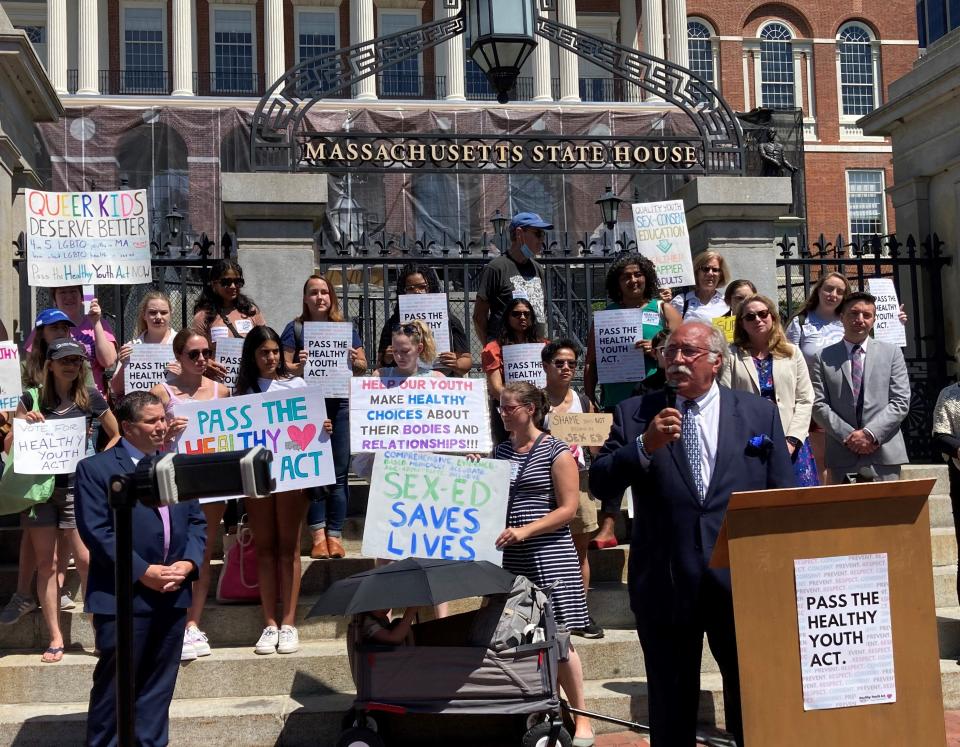Bill setting statewide standard for teaching sex and health ed one step closer to law
- Oops!Something went wrong.Please try again later.
BOSTON - Following a polling vote in the Senate Committee on Ways and Means Thursday, a bill requiring all Massachusetts public school districts opting to teach sex and health education follow a medically accurate, age-appropriate and inclusive curriculum is one step closer to the governor’s desk.

The Senate has already scheduled the Healthy Youth Act bill, sponsored by Sen. Sal DiDomenico, D-Everett, for a floor vote. If passed, and it has been passed four times already, it will be up to the House to push it through to the finish line.
The companion bill was filed by Rep. James O’Day, D-West Boylston.
The legislation was given a boost last summer when Gov. Maura Healey directed the state Department of Elementary and Secondary Education to establish a framework for updating the Massachusetts sex education curriculum.
Framework set - now it's up to Legislature
The framework designed and adopted by DESE outlines what students should know at each grade level but does not create any content as to what districts should teach. Districts would be free to choose an established curriculum that fits the framework — that it is medically accurate, age-appropriate and inclusive.
“It would not be strictly abstinence,” said DiDomenico. Currently, it’s a patchwork system in Massachusetts with some districts meeting the framework, others opting not to include health and sex education in the curriculum, and still others teaching abstinence only.
“Our children are talking about (sex) this, in classrooms or among themselves,” DiDomenico said, noting that the information they share is not always correct or accurate. “We can’t not teach this; if they make bad decisions based on bad information, it can have long-term consequences.”
The proposed bill requires that the sex and health education curriculum include medically accurate information about human development that includes anatomy and human reproduction and sexual development.

Teachers would be required to address both the benefits of abstinence as well as the use and effectiveness of contraceptives. They would also address interpersonal relationship development, including ways to discuss safe sexual activity with prospective partners, the parameters of consent, communication skills for healthy relationships as well as issues of gender identity and sexual orientation. It would require affirmative recognition that people have different sexual orientations, gender identities and gender expression.
The bill directs DESE to review and update the comprehensive health curriculum framework at least every 10 years. Municipalities would be required to collect and report data to DESE every two years on the community’s sex education curriculum that includes the numbers of students enrolled and those withdrawn from the program.
Keeping curriculum up to date
DiDomenico believes the data collection is imperative and would establish a database of what districts are teaching.
“Establishing healthy relationships is a big part of what we are proposing be taught in schools.” DiDomenico said, adding he believes it is as important to developing youngsters as learning math, science and language arts. He laments that a whole generation of youngsters was denied the education and left to fend for themselves.
On the House side of things, O’Day, who has filed the bill repeatedly over the last decade, is still fighting to get it out on the floor for debate and a vote.
“I have been disappointed over the years that we haven’t been able to put both chambers together in a conference committee” to get the work to pass the bill done, O’Day said. Opposing voices in the House have proven to be powerful.
“The Senate is very strongly behind the bill, and it shows its support in every session,” O’Day said. He noted that none of his Senate colleagues who have voted for the bill have been challenged by the community on that vote; not one has had to fight to retain their seat because they had voted to advance the measure.
“We represent the same areas, the same districts,” O’Day said.
Bill stuck in process
The bill is stuck between legislative branches.
And even as representatives dither, O’Day pointed out that it is the state’s youth who are suffering the consequences, leaving grade school and attending college without the tools necessary to know how to form healthy adult relationships.
”We’re leaving kids to their own devices on this,” O’Day said.
In the Worcester District, O’Day was happy to note, the city managed to enact a “good” curriculum and framework for sex education. Many voices were heard in the process, including some who declared that the schools would be teaching pornography, and that a comprehensive sex education curriculum encourages sexual activity among young people.
However, O’Day said, parents and guardians in the city area allowed to opt their children out of the class.
The proposed bill also gives parents and guardians the final stay in whether they would allow their children to attend the classes. They could opt them out with no adverse effects on their grades. Districts would be required to schedule alternate educational activities for children who have been opted out of the classes by their parents.
In looking over recent legislation, O’Day was gratified the state addressed ancillary issues involving human sexual relationships, such as dating violence and revenge porn. However, he said, addressing those issues before they crop up, while young adults are still in their formative years and in school, could mitigate the need to include lesser penalties for young adults.
The framework for sex and health education has not been updated in Massachusetts since 1999, DiDomenico noted, adding that the world has changed in the last 25 years.
This article originally appeared on Telegram & Gazette: Filed five times, sponsors hope it reaches the governor's desk

